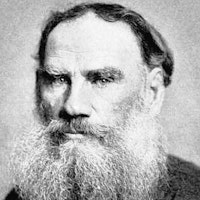The truth is always accessible to a man. It can’t be otherwise, because a man’s soul is a divine spark, the truth itself.
Leo N. Tolstoy

A Divine Spark
Topic: Truth, Law, & Principle
People usually think that progress consists in the increase of knowledge, in the improvement of life, but that isn’t so. Progress consists only in the greater clarification of answers to the basic questions of life. The truth is always accessible to a man. It can’t be otherwise, because a man’s soul is a divine spark, the truth itself. It’s only a matter of removing from this divine spark everything that obscures it. Progress consists, not in the increase of truth, but in freeing it from its wrappings. The truth is obtained like gold, not by letting it grow bigger, but by washing off from it everything that isn’t gold.
Count Lev Nikolayevich Tolstoy, known widely as Leo Tolstoy, was born on September 9, 1828, and is celebrated for his profound contributions to literature as a Russian novelist. He penned two of the greatest novels in literary history, 'War and Peace' and 'Anna Karenina,' both of which explored the intricacies of human nature and society in an era of profound change in Russia. Tolstoy was not only a master of realistic fiction, but also a prominent figure in the movement for political and social reform in Russia, his beliefs straying towards anarchism as he vehemently criticized institutional power structures and advocated for a return to a more simple, agrarian society.
Tolstoy was deeply influenced by Christian teachings, developing a distinct interpretation that emphasized the principles of non-violence, universal love, and inner moral reform. His spiritual beliefs profoundly shaped his worldview and his writings, with a focus on the ethics of the Sermon on the Mount and Jesus's commandment to turn the other cheek. In embracing this ascetic and nonviolent interpretation of Christianity, Tolstoy was often at odds with the official Russian Orthodox Church, leading to his ex-communication in 1901.
One of Tolstoy's most impactful works from his later years was 'The Kingdom of God is Within You', a philosophical treatise on the implementation of nonviolent resistance as a force for change. This work has had a far-reaching impact on the global stage, notably influencing iconic figures such as Mahatma Gandhi and Martin Luther King Jr. who used Tolstoy's ideas to form the basis of their respective nonviolent civil rights movements. Leo Tolstoy passed away on November 20, 1910, but his legacy lives on through his works and the enduring influence of his moral and philosophical ideals.
Tolstoy's Diaries
Tolstoy, Leo, and Reginald Frank Christian. Tolstoy's Diaries. Faber, 2010, [Leo N. Tolstoy's Diaries (1985), edited and translated by R. F. Christian. London: Athlone Press, Vol 2] p. 512.

Leo N. Tolstoy
Theme: The Light of Truth

Mohandas K. Gandhi, Leo N. Tolstoy
Additional Leo N. Tolstoy Quotes
Related Quotes
Copyright © 2017 – 2025 LuminaryQuotes.com About Us